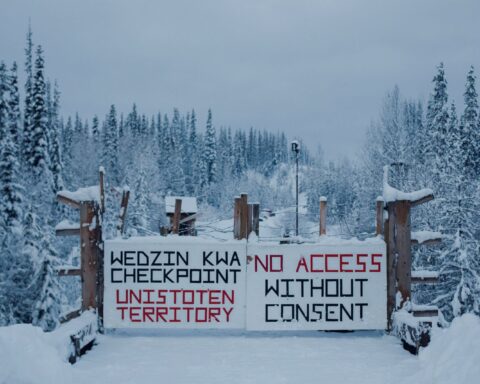Call Her Ganda
(USA, 97 min.)
Dir. PJ Raval
Programme: World Showcase (International Premiere)
The headline at the movies this year might be gender parity and #MeToo, and rightfully so, but one would be remiss to overlook the notable transgender stories at Hot Docs and within the film scene more broadly. Films like Michael Del Monte’s compelling Transformer, for example, with its fascinating study of gender roles, performance, and power in the tale of weightlifting Janae Croc. (See the current issue of POV for an article on the topic by Matt Hays that looks at films such as Transformer, Barbara Kopple’s This is Everything: Gigi Gorgeous, and Yance Ford’s 2017 Hot Docs selection/Oscar nominee Strong Island.) Essential to this growing field, and second only to Strong Island is the exceptionally powerful Call Her Ganda directed by PJ Raval. This doc is a significant tale of the fight to see trans rights as human rights and to confront the greater systems of power that continue to compound inequality. It’s a tough but vital film.
Call Her Ganda examines the tragic and violent murder of Filipina trans woman Jennifer Laude, who died at the hands of US Marine Joseph Scott Pemberton. Haunting images of Jennifer show a tall, proud, and vivacious woman in the prime of her life. Visits with her mother Julita, sure to be one of the unforgettable subjects in documentary this year, convey a family filled with love and now, heartache. The doc lays out the facts of the case through interviews with Julita’s lawyer, Virgie Saurez, and with investigative journalist Meredith Talusan, herself a transgender woman who identifies strongly with Jennifer. Both parties explain how Jennifer left a bar with Pemberton and went to a hotel to fool around. They explain how Pemberton left the hotel alone and how Jennifer’s friend found her body in the bathroom, a victim of a violent act of rage. When Pemberton later takes the stand, his lawyers claim self-defence in a statement of outright transphobia.
Complications ensue as Saurez and Talusan explain the difficulty of trying Pemberton, since the Americans enjoy protection under the Visiting Forces Agreement, which lets Uncle Sam keep jurisdiction over his rowdy troops. We learn that the American boys are reared on a history of violence and misogyny, which Raval illustrates brilliantly through some archival army reels that talk about off-duty leisure hours as free time for soldiers to use the “exotic” locals as they please. It’s clear that the agreement perpetuates grievous injustice. Before Pemberton’s trial, no U.S. soldier had been convicted in Filipino court.
The Pemberton case became a watershed moment for transgender rights in the Philippines. Call Her Ganda gives voice to several members of the transgender community in the Philippines, who bravely took to the streets and rallied for their rights and survival. The media exposure from the case was invaluable and, as Raval captured members of the community refusing to be branded as undesirables who “deserve” violent fates, the doc conveys a passionate fight for survival that audiences everywhere need to hear. Pemberton is so obviously guilty—like O.J. level guilty—and his defendants actively perpetuate transphobia by calling Jennifer by male pronouns and her birth name “Jeffrey.” The case tragically speaks to the failures of recognizing the needs and rights of victims of hate crimes.
Laude’s death also became a lightning rod for the increasingly tense relationship between the Philippines and long entrenched colonial force of the United States of America. Laude’s death is a direct result of decades of colonial exploitation and jingoist entitlement over the Philippines. The film incisively articulates how ongoing human rights abuses result from systemic inequality and colonial rule. Raval interrogates the murder case from all angles and reveals the unmistakable links between the loss of Laude’s life, the disregard for transgender rights, and the colonial influence. It’s intelligently intersectional in its dissection of current affairs.
Call Her Ganda takes audiences through a gripping roller coaster of emotions. Saurez and Talusan are compelling guides throughout the film, and their investment in Laude’s story asks audiences to recognize that more victims are sure to come should the courts fail to deliver justice. Laude’s family is the heart of the film, however, and the love for their daughter, sister, aunt, and friend shows that they (and she) deserve justice.
Call Her Ganda
-Sat, Apr. 28 at 9:15 PM at Isabel Bader
-Sun, Apr. 29 at 3:45 PM at TIFF Lightbox
-Sun, May 6 at 5:45 PM at Scotiabank
Hot Docs runs April 26 to May 6. Please visit hotdocs.ca for more info.











